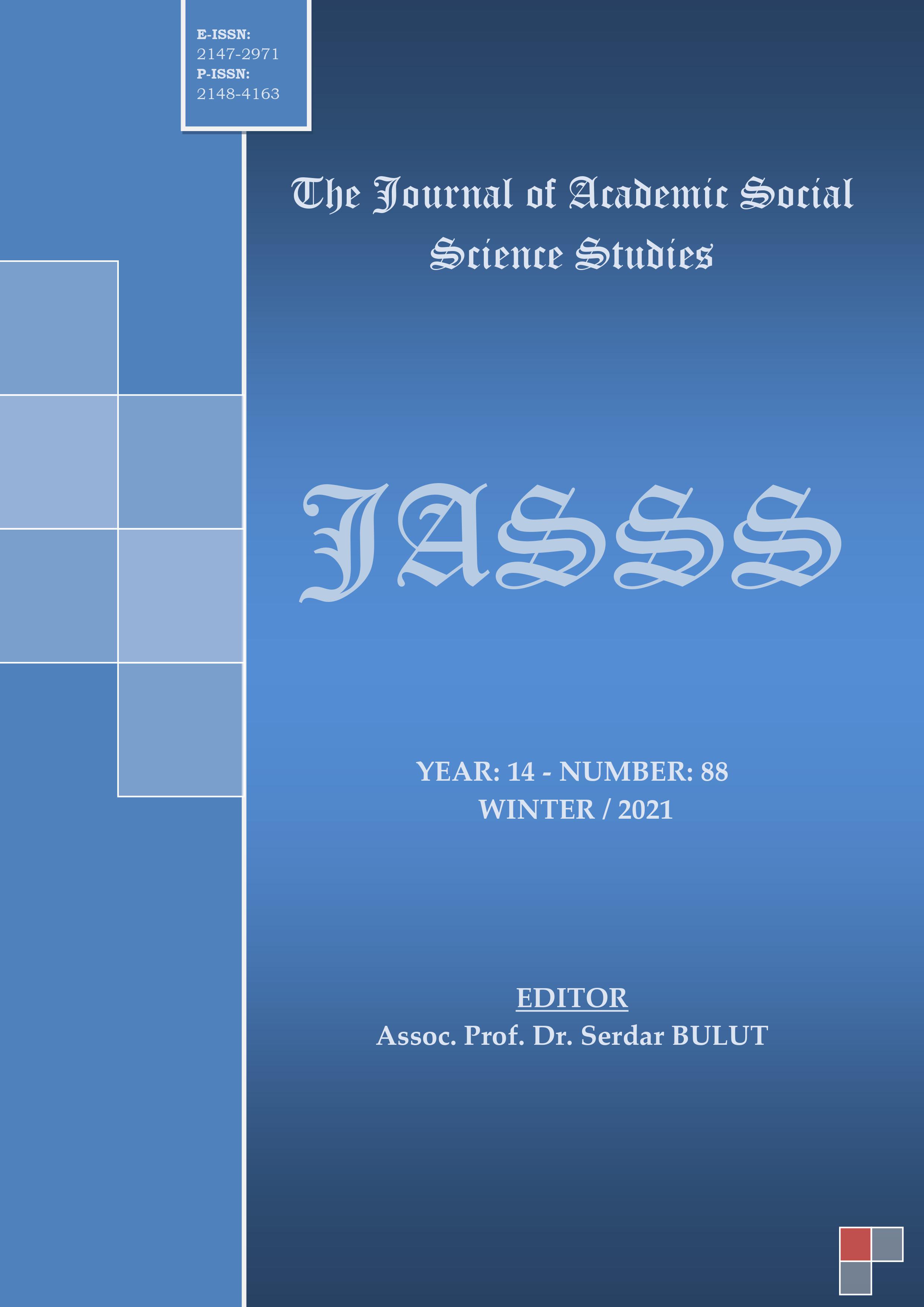Author :
Abstract
Doğan her çocuk onun varlığını önemseyen, gelişiminin tüm aşamalarının sağlıklı doğrultuda tamamlamasından sorumlu bir sosyal çevreyi hak eder. İnanç gelişimi de başta ebeveyn olmak üzere, bu sosyal çevreyi oluşturan diğer yetişkinler tarafından tıpkı fiziksel, zihinsel, kişilik ve ahlak gelişimi alanları gibi gerekli esas ve usullerle takip edilmelidir. Bu araştırmada İslam Kelam ve Akaidinin temel kaynakları olan Kur’an ve Sünnetten seçilen iki pasaj, sözlü ya da yazılı iletişime konu olan olayların iletişimsel değerini analizde kullanılan bir yöntem olan, içerik analizine tabi tutulmaya çalışılmıştır. İçerik analizine tabi tutulacak metinlerin seçiminde etkili olan birincil faktör, Kur’an-ı Kerim ve Sünnet’in, İslam akaidinin temel kaynakları olmasıdır. İkincil faktör ise, gerek Kur’an-ı Kerim’den gerekse Sünnetten seçilen örneklerde yer alan olayın taraflarından bir tanesinin çocuklar olması ve olay örgüsünün çocukla onun yakın çevresinden bir yetişkin arasında, İslam inanç esasları etrafında şekillenmesidir. İçerik analizi görsel ya da yazılı hale getirilen iletişimi konu edinir. Dille inşa edilen her türlü sözlü veya yazılı iletişim, içerik analizine konu edilebilir. Edebi ve ilahi metinler de bunlar arasında yer almaktadır. İçerik analizine konu olan her iki örnek olayda da taraflardan bir tanesinin çocuklar, bir diğerininse yakın çevresinden yetişkinler olması bu seçimde etkili olmuştur. Alan literatürden verilere de başvurularak yapılan içerik analizleri sonucunda, çocuk inanç esasları hakkında soru sorsun ya da sormasın, onunla inançlar hakkında konuşmanın gerekliği, bu konuşmanın tutarlılığı için çocuğu kuşatan kültürel ortamın önemli bir ögesi olan dilin doğru kullanımının önemi vb. çocukla inançlar üzerine doğru ve tutarlı konuşmanın imkânı üzerine elde edilen bulgular sıralanmaya çalışılmıştır.
Keywords
Abstract
Every child born deserves a social environment that cares about his or her well-being and is responsible for completing all stages of its development in a healthy way. Belief development should also be followed by the parents and other adults who make up this social environment, just like the physical, mental, personality and moral developments, with the necessary principles and procedures. In this research, two passages selected from the Qur'an and Sunnah, which are the main sources of Kalam and the Creed, are subject to content analysis, which is a method used to analyze the communicative value of events that are the subject of verbal or written communication. The primary factor affecting the selection of passages to be subject to content analysis is that the Qur'an and Sunnah are the main sources of Islamic creed. The secondary factor is that children are one of the parties to the event in the passages chosen from both the Qur'an and the Sunnah, and the plot is shaped around the principles of Islamic belief between the child and an adult from his close circle. Content analysis deals with visual or written communication. Any verbal or written communication constructed with language can be subject to content analysis. Literary and divine texts are also among them. In both passages, the fact that one of the parties was children and the other one was an adult from their close circle have been effective in this choice. As a result of the content analyzes made by referring to the data from the field literature, whether a child might ask questions about the principles of belief or not, following findings are going to be listed: the necessity of talking with him about beliefs, the importance of the correct use of language, which is an important element of the cultural environment surrounding the child for the consistency of this conversation, a correct and consistent conversation with the child about beliefs.
Keywords
- Ay, M. E. (2018). Çocuklarımıza Allah’ı Nasıl Anlatalım? İstanbul: Timaş Yayınları.
- Ay, M. E. (2018). Çocuklarımıza Allah’ı Nasıl Anlatalım? İstanbul: Timaş Yayınları. Ay, M. E. (1994). Din Eğitiminde Mükafat ve Ceza. İzmir: Nil Yayınları.
- Aydın, M. Z. 2016) Din Öğretiminde Yöntemler. Ankara: Nobel Yayıncılık.
- Berk, L E. (2013). Bebekler Çocuklar: Doğum Öncesinden Orta Çocukluğa. Ankara: Nobel Akademik Yayıncılık.
- Buhârî, M. (2002). el- Câmiʻu’s-sahîh. 2 Cilt. Şam: Dâr-u İbn Kesîr.
- Cezâirî, T. (1986). el-Cevâhiru’l-kelâmiyye fî îdâhi’l-ʻakîdeti’l-İslâmiyye. Beyrut: Dâr-u İbn Hazm. Durak, M. (2016). Aklımın Aklı: Psikoloji. Ankara: Nobel Akademik Yayıncılık.
- Gazzâlî, M. (2014). Eyyühe’l-Veled. Beyrut: Dâru’l-Minhâc.
- Gökçe, O. (2019). Klasik ve Nitel İçerik Analizi. Konya: Çizgi Yayınevi.Gölcük, Ş. (2000). Kelam Tarihi. İstanbul: Kitap Dünyası, 4. Basım,Hattâbî, E. S. (1932). Meâlimü’s-sünen. Halep: Matba’atü’l-ʻilmiyye.
- İbn Düreyd, E.B. (1987). Cemheretü’l-Luğa. Beyrut: Dâru’l-İlm li’l-Melâyîn.
- İbn Ebû Şeybe, E. B. (1988). el-Kitâbü’l-musannef fi’l-ehâdîsi ve’l-âsâr. 7 Cilt. Riyad: Mektebetü’r-rüşd.İbn Hanbel, A. (2001). el-Müsned. nşr. Şuayb el-’Arnavût ve Adil Mesud. Beyrut: Müessesetü’r-Risâle.
- İbn Süleyman, M. (2016). Kur’an Terimleri Sözlüğü el-Eşbâh ve’n-Nezâir fi’l-Qurâni’l-Kerîm. İstanbul: İşaret Yayınları.
- İbn Süleyman, M. (2002). Tefsîru Mukâtil b. Süleyman. nşr. Beyrut: Dâru İhyâi’t-Türâs. İsfahanî, R. (2012). Müfredât. İstanbul: Çıra Yayınları.
- Kant, I. (2020). Eğitim Üzerine. çev. S. Emre Sekman. İstanbul: İz Yayıncılık. Kant, I. (1900). On Education. Boston: D. C. Heath and Co. Publishers.
- Kaya, Z. (2015). Türk Toplumunda İnanç Gelişimi ve Din Eğitimi. İstanbul: Değerler Eğitim Merkezi. Kurt, Y. (2005). “Kur’an’da Fıtrat Kavramı”. Din Bilimleri Araştırma Dergisi 5/2: 71-104.
- Kurtubî, M. b. A. (1964). el-Câmiʻ li-ahkâmi’l-Kur’ân. 20 Cilt. Kahire: Dâru’l-Kütübi’l-Mısriyye. Kutup, M. (1968). Menhecü’t-Terbiyeti’l-İslâmiyye. Kahire: Dâru’ş-Şürûk.
- Müslim, M. (1991). el- Câmiʻu’s-sahîh. nşr. Muhammed Fuâd Abdülbâkî. Kahire: Dâr-u İhyâ’il-Kütübi’l ʿArabiyye.
- Önkal, A. (2017). Rasûllullah’ın İslam’a Dâvet Metodu. İstanbul: Hikmetevi Yayınları.
- Rakaf, A. H. (2020). Çocukların İmanla İlgili Soruları. çev. Tuğba Rabia Aköz. İstanbul: Asalet Yayınları. Sanʻ ânî, A. (2013). el-Musannef. 10 Cilt. Kahire: Dâru’t-Te’sîl.
- Şanver, M. (2001). " Dini Tebliğ ve Eğitim Açısından Kur’an’da İnsan Psikolojisi ve Özellikleri", Uludağ Üniversitesi İlahiyat Fakültesi Dergisi, C. X, S.1: 137-164.
- Selçuk, M. (1991). Çocuğun Eğitiminde Dini Motifler. Ankara: Türkiye Diyanet Vakfı Yayınları.
- Şahin, C. (2016). Eğitim Psikolojisi: Gelişim, Öğrenme, Öğretim. Ankara: Nobel Akademik Yayıncılık Terkıfî, M. A. (2004). Hadîs-ü Abbâs et-Terkıfî. Bernâmec el-Cevâmiʻul-Kelim.
- Uludağ, S. (1992). İslam’da Emir ve Yasakların Hikmetleri. Ankara: Türkiye Diyanet Vakfı Yayınları. Yeşilyurt, T. (2016). Söz’ün Anlamı. İstanbul: İnsan Yayınları.
- “çocuk ne demek TDK Sözlük Anlamı”. Erişim 01 Ağustos 2021. https://sozluk.gov.tr/?kelime=çocuk “
- ”. Erişim 23 Ağustos 2021. http://www.aslein.net/showthread.php?t=13975





